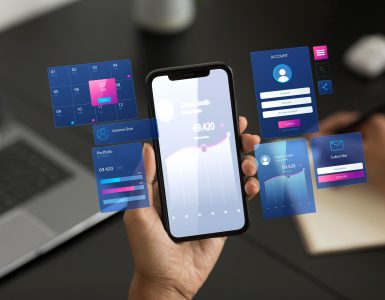Artificial intelligence is no longer considered a futuristic technology but a requirement of the present. Many industries are always taking full advantage of AI; unsurprisingly, the software and app development domain top the list. Mobile app development companies cannot be lenient with adopting new technologies. It is because new changes in technologies are often platform supported that mandates the adoption to create secured and useful applications. According to Statista, mobile apps benefit from artificial intelligence in several ways. From predictive text and voice assistance to location-based app suggestions, a lot can be achieved using AI. Fierce competition demands the adoption of artificial intelligence in mobile app development.
That’s what this article will explore. We dive deeper into how most successful app development companies integrate AI into their products.
1. Chatbots
Chatbots are everywhere. WhatsApp support for businesses, Facebook Messenger bot for social connections, and recently, Microsoft’s Bot Framework for enterprises and more. Now, chatbots can use NLP or Natural Language Processing to provide app users with suggestions, assistance, and services. An easy way to incorporate AI in mobile app development is through chatbots. You can implement complex capabilities, too, with chatbots, such as speech recognition and cognitive abilities. All these features make conversations more human-like, improving the end-user experience.
Siri and Alexa are the best examples of how Amazon and Apple apps use chatbots to offer services, suggestions, and assistance.
2. Facial recognition
Facial recognition has become a powerful feature to implement in apps with better camera technology. Primarily used for security and recognition applications in conjunction with other information, facial recognition also has use in other apps. Improving image processing algorithms and cheaper hardware makes it possible to build myriad applications using facial recognition. Facebook, Snapchat, and Google Photos, all these apps use facial recognition to sort data, recommend interests, and offer filters. If your app is in the messenger category, you can boost its camera and photo filter capability using facial recognition. Some other ways to use this AI technology in mobile apps are text translation, image recognition, and information processing.
3. Recommendations
Suppose you are familiar with the OTT platforms like Netflix, Prime Video, and Hulu. In that case, you probably know how their streaming recommendation feature helps them to keep hundreds of thousands of customers engaged. These mobile apps use artificial intelligence to empower their recommendation algorithms. You can use AI and Machine Learning to augment your app’s decision-making capability.
These technologies give a mobile app the tools necessary to recommend products, services, or shows based on the user’s age, gender, location, and preferences.
Recommendations based on artificial intelligence are much more relevant and have high conversion rates than those randomly offering suggestions. Almost all big brands use this AI feature in their mobile apps to cross-sell and upsell products. If your app is in the shopping or entertainment category, we recommend using AI.
4. Better app reasoning
Today, mobile apps can do almost anything with the right technology. Given the capabilities of new artificial intelligence algorithms like deep learning and reinforcement learning, developers can make their applications phenomenal.
When you implement AI-based app reasoning, it makes your mobile application a lot smarter. Based on previous user data, it can determine what information the user needs at a given time and provide appropriate options. For instance, the Google Glass app can help you find the available parking spot by using the surrounding data about cars and available space. Most modern car GPS navigation systems rely on AI to find the best route. Another example is Microsoft’s Cortana digital assistant, which can learn new tricks with the AI chatbot Zo.
5. Sentiment analysis
Sentiment analysis might be the most complex implementation of AI in mobile app development. It primarily involves deciphering what people think about a particular entity which can be a brand, product, person, or idea. Some mobile apps already use sentiment analysis to provide feedback to brands about their customers’ perspectives of their products and services.
Another use of this AI implementation is to decide which are the most frequently used features. It helps optimize the app and remove any unwanted or unnecessary features. Mobile development companies are increasingly using sentiment analysis to offer apps that help businesses make better decisions based on customer satisfaction levels. An example of such an app is AppBot which helps developers do sentiment analysis of their product reviews.
Conclusion
We assume that you now have a clear understanding of how AI can enhance the quality of your mobile applications. Implementing the above-listed artificial intelligence concepts in your application requires a more profound understanding, irrespective of mobile app development frameworks. As the future of mobile development will depend on AI greatly, it is essential to explore opportunities for advanced mobile app development.
Talent500 is the platform on which Fortune 500 companies and global startups build their remote mobile development teams. Join our elite pool of mobile developers and work with some of the best engineers in the world.






Add comment